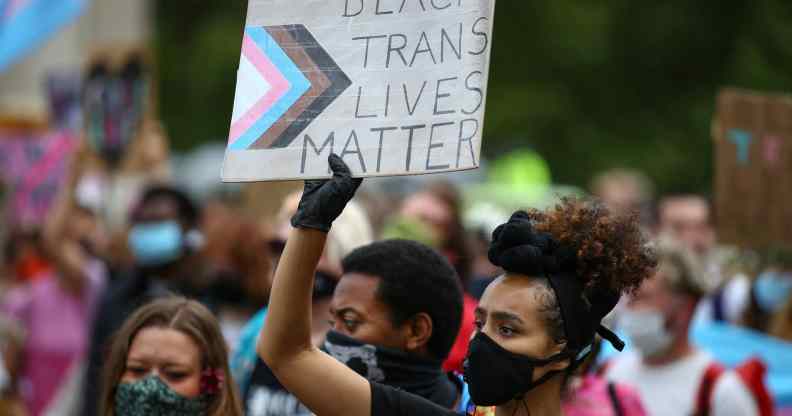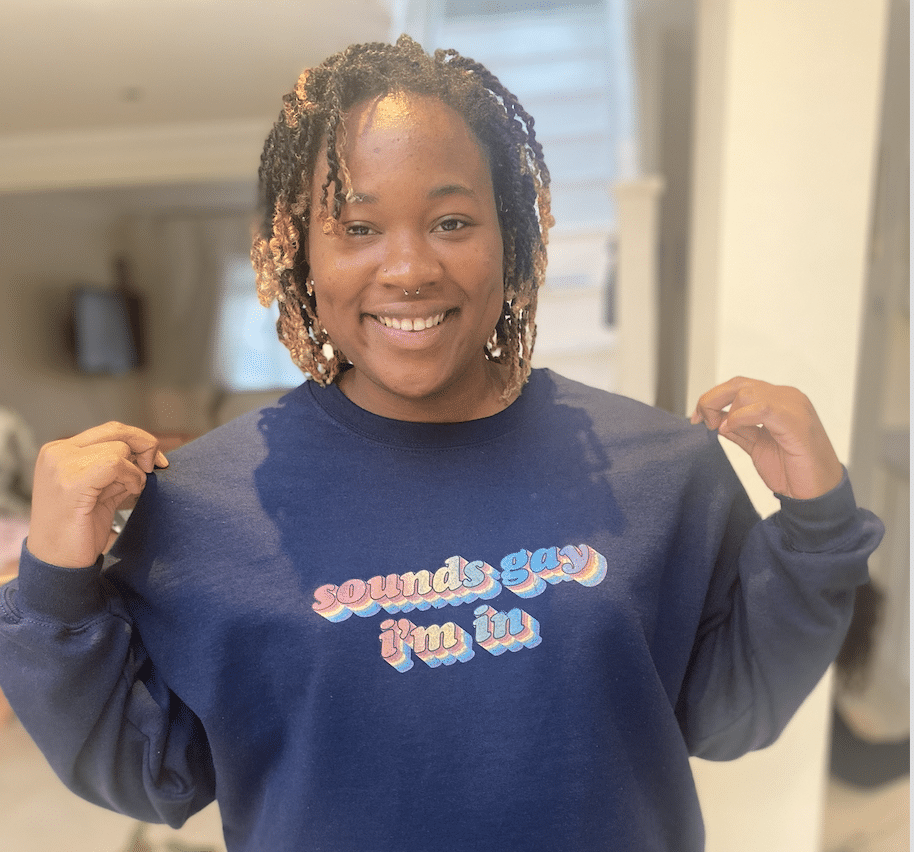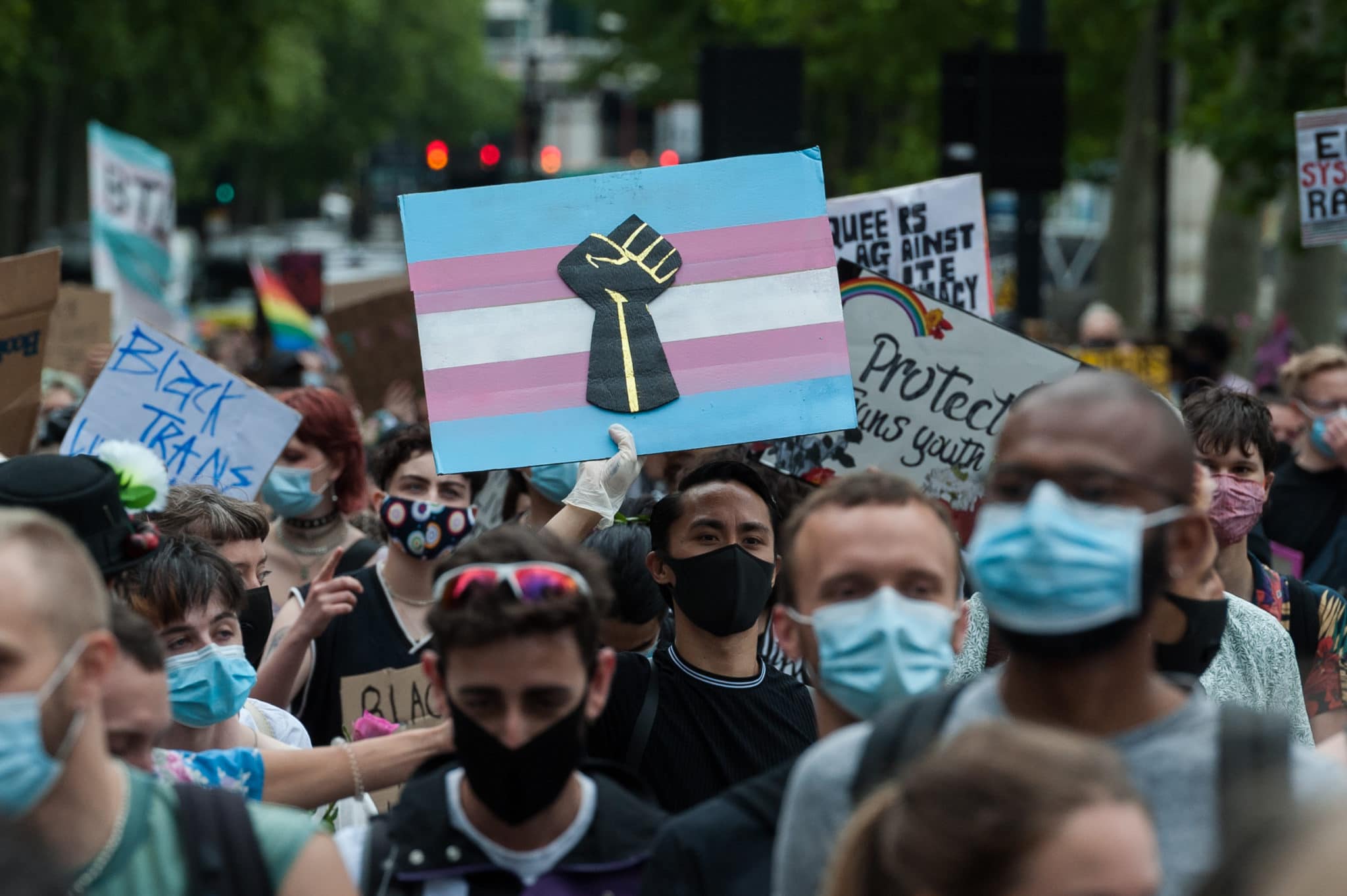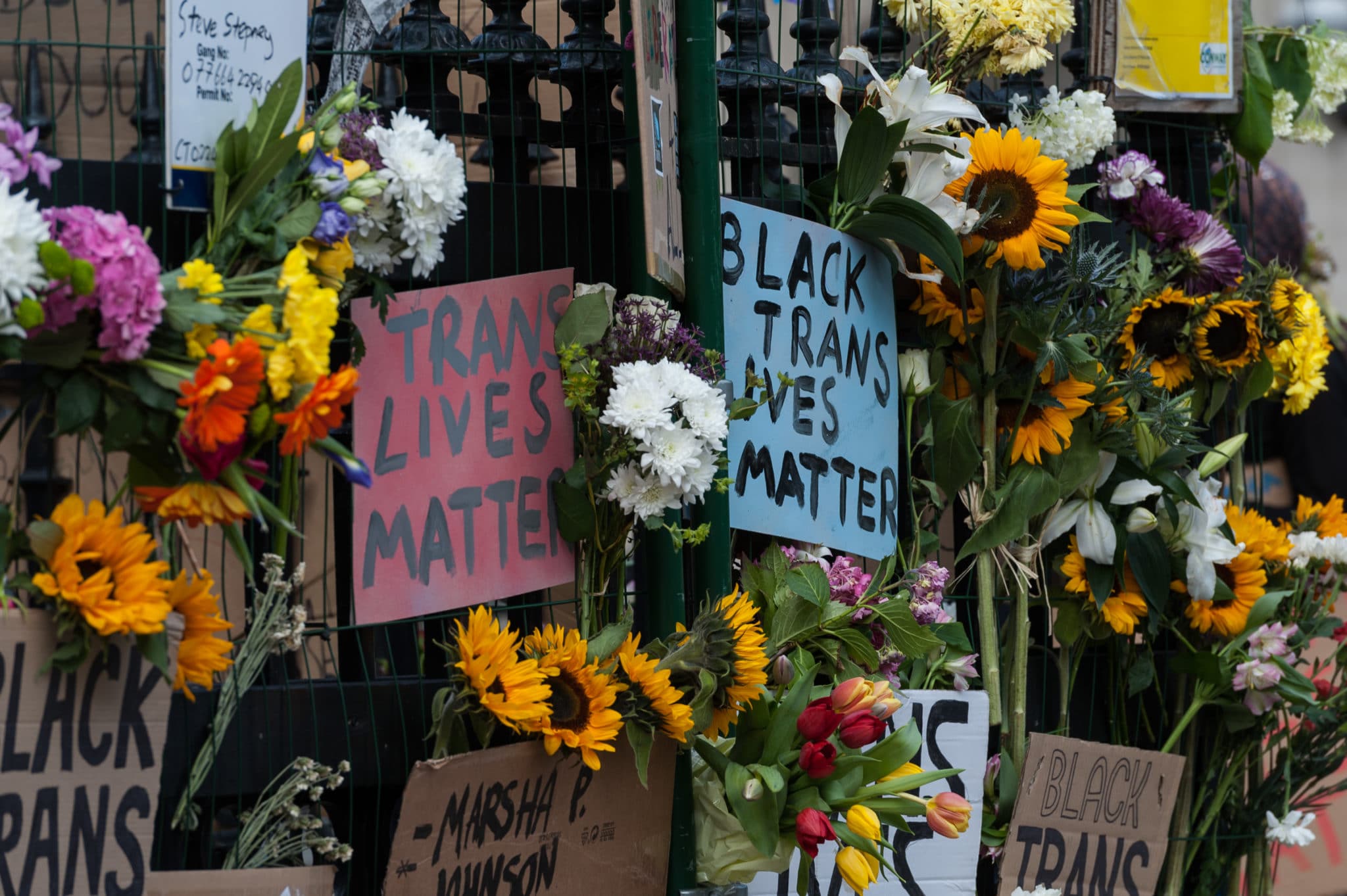Black trans people face relentless bigotry in healthcare, LGBT+ spaces and wider society. This activist wants to change all that

Game of Thrones actor Nathalie Emmanuel at a Black Trans Lives Matter march in London, June 2020. (Hollie Adams/Getty)
From a year that will be remembered for death, plague, existential dread and political unrest, one pivotal moment endures.
The murder of George Floyd, on 25 May in Minneapolis, sparked protests across the US and then the world, the size of which had never been seen before.
The resurgence of the Black Lives Matter movement in the wake of Floyd’s death saw more than half a million people demonstrate against police brutality and racism on a single day in the US – making it the largest movement in the country’s history.
Rallying cries at Black Lives Matter marches began including All Black Lives Matter. Black Queer Lives Matter. Black Trans Lives Matter. This was accompanied by the steady release of damning data, showing that Black people are twice as likely to catch coronavirus, four times as likely to die of COVID-19 and that Black men in particular have the highest death rate from the deadly disease.
Meanwhile, the trans community has experienced a dangerous uptick in transphobic rhetoric in the media, a long-awaited and ultimately failed “reform” of the Gender Recognition Act, and waiting times for healthcare that have spiralled to lengths that mean in some parts of the country, trans people wait four years for their first appointment at an NHS gender dysphoria clinic.
Moreover, four in five trans people in Britain have experienced a transphobic hate crime in the last year. Black trans people face racism from wider society, within LGBT+ spaces, and in accessing healthcare.
Queer activist Azekel Axelle, who is fundraising to provide free therapy to Black trans people through the Black Trans Foundation, spoke to PinkNews about tackling these injustices.
What is the Black Trans Foundation?
Black Trans Foundation is a new non-profit organisation working for the social advancement of Black trans people in the UK.
We are building a world where Black trans and gender non-conforming (GNC) people have the same access to healthcare and opportunities as their cisgender counterparts.
When referring to Black, we describe those who are Black or of Black mixed heritage.
And we are using trans as an umbrella term and are referring to those who do not identify with the gender that they were assigned at birth. This includes but is not limited to those who are trans and/or non-binary, genderfluid, agender, gender non-conforming and questioning.
What can we expect to see in the coming months and years?
Our first project is the Black Trans Free Therapy project, where we will be providing four months of free therapy to at least 10 Black trans and GNC individuals in the UK. We are raising £10,000 for this initiative with a fundraiser, which you can read about here.
Happy #TransAwarenessWeek
We’re excited to announce that we’re raising money for our first project, the Black Trans Free Therapy fund. Your donations will allow us to offer at least 10 Black trans people free therapy for 4 months! Link in bio 🌻 pic.twitter.com/L1zQznq4Vi
— Black Trans Foundation (@BlackTransUK) November 15, 2020
Therapy is extremely inaccessible and once you add Black and trans into the mix, it’s even more difficult to find a therapist who is able to empathise with these complex identities. Black trans people deserve to speak to therapists who look like them and share their lived experience.
We are not only bridging the financial gap, but finding and matching the individuals with therapists that tailor to their unique and specific needs. This erases the emotional labour that is often undertaken and makes an already daunting process easier and more accessible.
Introduce yourself! Who are you?

Azekel Axelle, founder of Black Trans Foundation. (Supplied)
My name is Azekel Axelle (they/them) and I’m a Black, queer and trans activist.
I create community spaces that foster an environment of safety and acceptance for those with intersecting marginalised identities. Among those I work with are the Black trans community, the QTIPOC (queer, trans and intersex people of colour) community and Black women.
Why have you set up Black Trans Foundation? What led you to this point?
In the summer of 2020, I raised £10,000 for my top surgery. However, I realised that I would not have been able to do this without the privileges I was afforded: I am out to my immediate family and they love and accept me. Therefore I did not have to hide my identity, unlike countless others in my community for fear of rejection and even worse, being kicked out.
I also have a large platform which helped me greatly in raising the funds. I wanted to start Black Trans Foundation to provide a way for my community to have access to the resources that allowed me to receive this life-saving and gender-reaffirming surgery.
Luckily at the time, The Blagrave Trust had launched a grant called “Challenge & Change” for any young person wanting to change the world. I applied and then continued raising funds, the grant falling to the back of my mind.
A few weeks after my top surgery, several months after I had applied for this grant, I received a call… the grant had been awarded! They had received £1,200,000 worth of applications, yet only had £95,000 to distribute.
That day was a beautiful day because they offered me the chance to show that Black Trans Lives Matter. Black Trans Foundation was founded, and I can proudly say that these funds are going towards paying a team of three Black trans people to do the necessary work. Too often we do this work for free and can barely survive. I wanted to change that.

The June 2020 Black Trans Lives Matter march in central London saw thousands celebrate the Black trans community and commemorate the Black trans lives lost. (Wiktor Szymanowicz/Barcroft Media via Getty Images)
What issues do Black trans people face in the UK, and how will the Black Trans Foundation be tackling them?
Racism in healthcare.
Zero representation in Black spaces and LGBT+ spaces.
Erasure from the LGBT+ narrative.
Isolation and depression and poor mental health, made worse by the lack of access to resources.
Discrimination in work and daily life.
We are at the beginning of our journey. The first issue we will be tackling is poor mental health, with our Black Trans Free Therapy scheme. Additionally, by creating three remote and well-paid positions at the organisation, we are also addressing discrimination in work.
We hope to go on to commission research into the needs of our community and present this to healthcare officials and policymakers to demand change.
View this post on Instagram
Who are the other community organisers that you’re inspired by, and why?
Maria (they/them) – A facilitator at Stonewall who has encouraged me since the beginning of my activism journey. I attended Stonewall’s first ever POC Young Campaigner’s three-day residential (the start of my activism journey) and Maria was one of the facilitators. They have paved the way for the many opportunities that have made me the organiser I am today.
Shay (they/them) – a Black trans activist who has spoken at Black Pride, hosted Gendered Intelligence Pride, voice acted for Adventures in Time and Gender and worked on The Resurrection Lands, an online interactive game for Black trans people by Danielle Brathwaite-Shirley.
Tanya Compas (she/her) – works tirelessly for Black queer youth and is setting up an organisation for them called Exist Loudly. She also raised over £100,000 for QTIPOC organisations and Exist Loudly.
Sabah Choudrey (they/them) – a brown trans activist and psychotherapist who co-founded Trans Pride Brighton and now does important work at Gendered Intelligence, an organisation for gender-diverse people.
Chloe Cousins (she/her) – part of the COLOURS team, an organisation for QTIPOC in the north. I attended the COLOURS festival in March in Manchester and it was so empowering to be surrounded by others like me.

Flowers and placards after the Black Trans Lives Matter march in London, June 2020. (WIktor Szymanowicz/NurPhoto via Getty Images)
How can white people best support – do you have a donation pot?
Amplify our voices, which means giving us the microphone, not just creating the platform.
Accept that there will ALWAYS be unlearning to do.
Acknowledge your privilege, but do not do so performatively – that defeats the point.
Do not take up space in places that are not meant for you.
White people acknowledging their privilege and roles in oppression isn’t enough. You need to do the work, and do it for the right reasons, otherwise we just get hurt even more.
Accept that it will take Black people a long time to deal with the trauma they have faced from whiteness, and so just because you’re doing the work, it doesn’t grant you access to us or our spaces.
Most importantly: donate! If you can’t, then the bare minimum is to share fundraisers and information to those who can.

